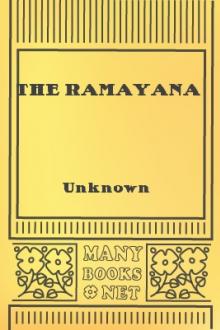The Ramayana - Valmiki (best ereader for epub txt) 📗

- Author: Valmiki
- Performer: -
Book online «The Ramayana - Valmiki (best ereader for epub txt) 📗». Author Valmiki
store the wood provides.”
Thus having said to Lakshmaṇ, he
Addressed in turn Sumantra: “Be
Most diligent to-night, my friend,
And with due care thy horses tend.”
The sun had set: Sumantra tied
His noble horses side by side,
Gave store of grass with liberal hand,
And rested near them on the strand.
Each paid the holy evening rite,
And when around them fell the night,
The charioteer, with Lakshmaṇ's aid,
A lowly bed for Ráma laid.
To Lakshmaṇ Ráma bade adieu,
And then by Sítá's side he threw
His limbs upon the leafy bed
Their care upon the bank had spread.
When Lakshmaṇ saw the couple slept,
Still on the strand his watch he kept,
Still with Sumantra there conversed,
And Ráma's varied gifts rehearsed.
All night he watched, nor sought repose,
Till on the earth the sun arose:
With him Sumantra stayed awake,
And still of Ráma's virtues spake.
Thus, near the river's grassy shore
Which herds unnumbered wandered o'er,
Repose, untroubled, Ráma found,
And all the people lay around.
The glorious hero left his bed,
Looked on the sleeping crowd, and said
To Lakshmaṇ, whom each lucky line
Marked out for bliss with surest sign:
“O brother Lakshmaṇ, look on these
Reclining at the roots of trees;
All care of house and home resigned,
Caring for us with heart and mind,
These people of the city yearn
[pg 149]
To see us to our home return:
To quit their lives will they consent,
But never leave their firm intent.
Come, while they all unconscious sleep,
Let us upon the chariot leap,
And swiftly on our journey speed
Where naught our progress may impede,
That these fond citizens who roam
Far from Ikshváku's ancient home,
No more may sleep 'neath bush and tree,
Following still for love of me.
A prince with tender care should heal
The self-brought woes his people feel,
And never let his subjects share
The burthen he is forced to bear.”
Then Lakshmaṇ to the chief replied,
Who stood like Justice by his side:
“Thy rede, O sage, I well commend:
Without delay the car ascend.”
Then Ráma to Sumantra spoke:
“Thy rapid steeds, I pray thee, yoke.
Hence to the forest will I go:
Away, my lord, and be not slow.”
Sumantra, urged to utmost speed,
Yoked to the car each generous steed,
And then, with hand to hand applied,
He came before the chief and cried:
“Hail, Prince, whom mighty arms adorn,
Hail, bravest of the chariot-borne!
With Sítá and thy brother thou
Mayst mount: the car is ready now.”
The hero clomb the car with haste:
His bow and gear within were placed,
And quick the eddying flood he passed
Of Tamasá whose waves run fast.
Soon as he touched the farther side,
That strong-armed hero, glorified,
He found a road both wide and clear,
Where e'en the timid naught could fear.
Then, that the crowd might be misled,
Thus Ráma to Sumantra said:
“Speed north a while, then hasten back,
Returning in thy former track,
That so the people may not learn
The course I follow: drive and turn.”
Sumantra, at the chief's behest,
Quick to the task himself addressed;
Then near to Ráma came, and showed
The chariot ready for the road.
With Sítá, then, the princely two,
Who o'er the line of Raghu threw
A glory ever bright and new,
Upon the chariot stood.
Sumantra fast and faster drove
His horses, who in fleetness strove
Still onward to the distant grove,
The hermit-haunted wood.
Canto XLVII. The Citizens' Return.
The people, when the morn shone fair,
Arose to find no Ráma there.
Then fear and numbing grief subdued
The senses of the multitude.
The woe-born tears were running fast
As all around their eyes they cast,
And sadly looked, but found no trace
Of Ráma, searching every place.
Bereft of Ráma good and wise,
With drooping cheer and weeping eyes,
Each woe-distracted sage gave vent
To sorrow in his wild lament:
“Woe worth the sleep that stole our sense
With its beguiling influence,
That now we look in vain for him
Of the broad chest and stalwart limb!
How could the strong-armed hero, thus
Deceiving all, abandon us?
His people so devoted see,
Yet to the woods, a hermit, flee?
How can he, wont our hearts to cheer,
As a fond sire his children dear,—
How can the pride of Raghu's race
Fly from us to some desert place!
Here let us all for death prepare,
Or on the last great journey fare;320
Of Ráma our dear lord bereft,
What profit in our lives is left?
Huge trunks of trees around us lie,
With roots and branches sere and dry,
Come let us set these logs on fire
And throw our bodies on the pyre.
What shall we speak? How can we say
We followed Ráma on his way,
The mighty chief whose arm is strong,
Who sweetly speaks, who thinks no wrong?
Ayodhyá's town with sorrow dumb,
Without our lord will see us come,
And hopeless misery will strike
Elder, and child, and dame alike.
Forth with that peerless chief we came,
Whose mighty heart is aye the same:
How, reft of him we love, shall we
Returning dare that town to see?”
Complaining thus with varied cry
They tossed their aged arms on high,
And their sad hearts with grief were wrung,
Like cows who sorrow for their young.
A while they followed on the road
Which traces of his chariot showed,
But when at length those traces failed,
A deep despair their hearts assailed.
[pg 150]
The chariot marks no more discerned,
The hopeless sages backward turned:
“Ah, what is this? What can we more?
Fate stops the way, and all is o'er.”
With wearied hearts, in grief and shame
They took the road by which they came,
And reached Ayodhyá's city, where
From side to side was naught but care.
With troubled spirits quite cast down
They looked upon the royal town,
And from their eyes, oppressed with woe,
Their tears again began to flow.
Of Ráma reft, the city wore
No look of beauty as before,
Like a dull river or a lake
By Garuḍ robbed of every snake.
Dark, dismal as the moonless sky,
Or as a sea whose bed is dry,
So sad, to every pleasure dead,
They saw the town, disquieted.
On to their houses, high and vast,
Where stores of precious wealth were massed,
The melancholy Bráhmans passed,
Their hearts with anguish cleft:
Aloof from all, they came not near
To stranger or to kinsman dear,
Showing in faces blank and drear
That not one joy was left.
Canto XLVIII. The Women's Lament.
When those who forth with Ráma went
Back to the town their steps had bent,
It seemed that death had touched and chilled
Those hearts which piercing sorrow filled.
Each to his several mansion came,
And girt by children and his dame,
From his sad eyes the water shed
That o'er his cheek in torrents spread.
All joy was fled: oppressed with cares
No bustling trader showed his wares.
Each shop had lost its brilliant look,
Each householder forbore to cook.
No hand with joy its earnings told,
None cared to win a wealth of gold,
And scarce the youthful mother smiled
To see her first, her new-born child.
In every house a woman wailed,
Free e-book «The Ramayana - Valmiki (best ereader for epub txt) 📗» - read online now
Similar e-books:





Comments (0)